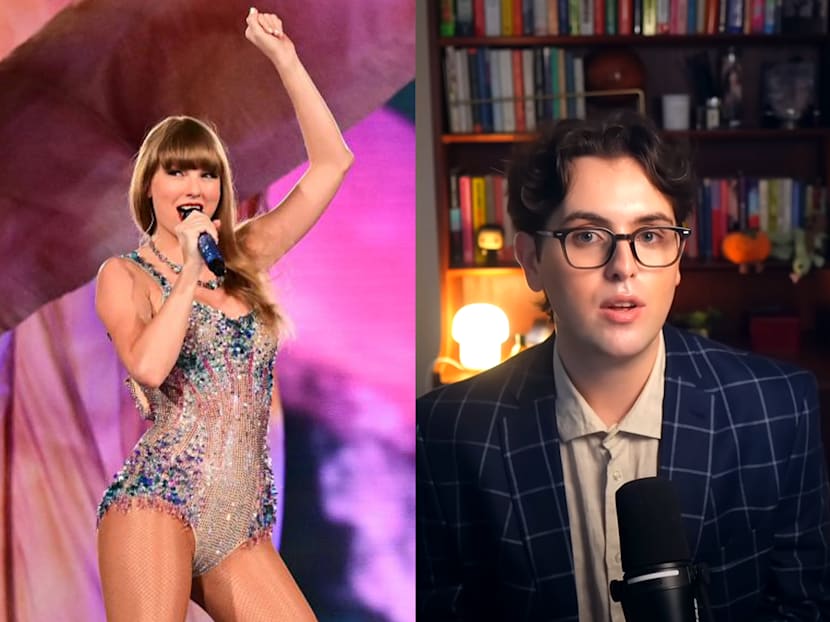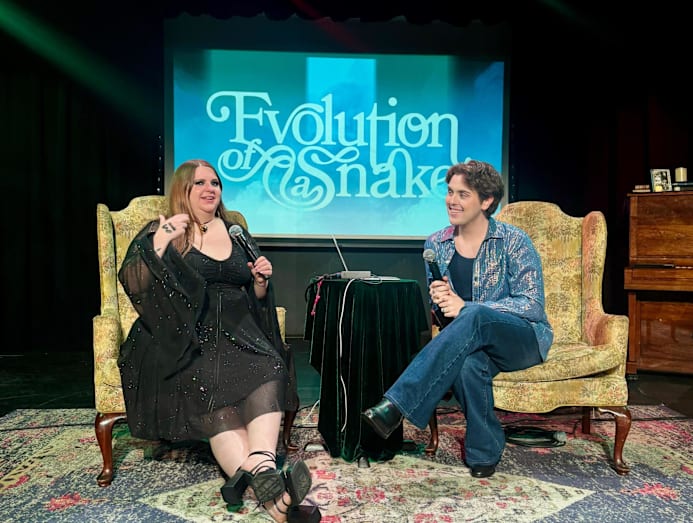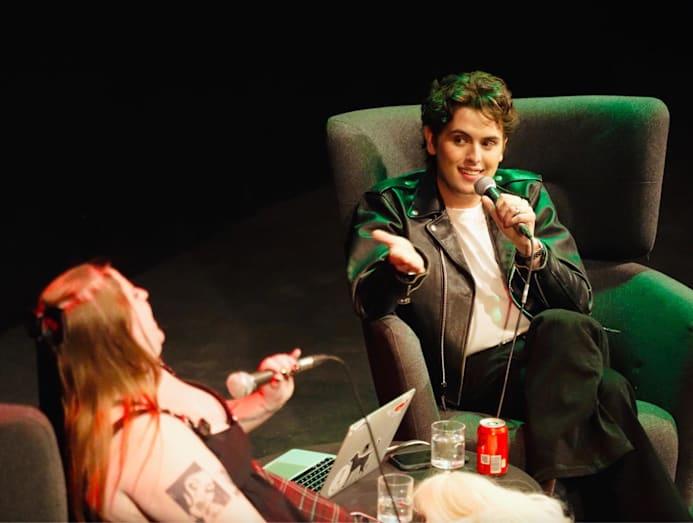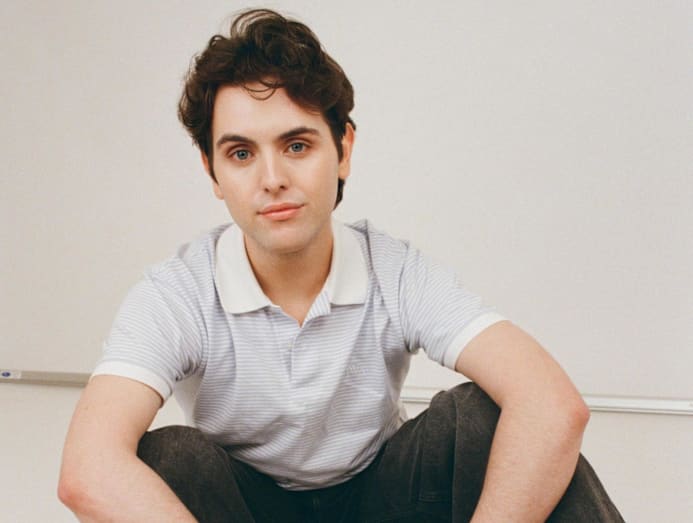Meet 'The Swiftologist': A full-time Taylor Swift content creator in Singapore with unfiltered pop culture takes
Singapore-based content creator Zachary Hourihane quit his corporate job in 2024 after realising he could make a full-time career from dishing out nuanced and thoughtful critiques on music, pop culture and, of course, Taylor Swift.

Singapore-based Zachary Hourihane, better known as The Swiftologist online, has made a full-time career from pop culture critiques. (Photos: CNA/Gaya Chandramohan, YouTube/Swiftologist)

This audio is generated by an AI tool.
There were probably few people anticipating the release of Taylor Swift’s 12th studio album The Life Of A Showgirl on Friday (Oct 3) as much as Zachary Hourihane.
The 28-year-old based in Singapore proudly identifies as a member of one of the world’s most powerful fandoms: He is a Swiftie.
Perhaps more importantly, he is a multiplatform creator whose fortunes rise and fall with Swift's success – a gamble that can look farsighted or farcical, depending on your vantage point.
Hourihane co-hosts a Taylor Swift podcast called Evolution Of A Snake with fellow pop culture content creator Madeline Rubicam, who lives in Montana in the US. He also runs his own YouTube channel, aptly named The Swiftologist.
The latter started with in-depth video critiques about Swift’s career, but has since expanded to cover broader Western mainstream pop narratives with the same critical lens.
He and Rubicam also run a Patreon with over 12,000 members, offering tiered access from S$4 (US$3.10) to S$33 a month. Members unlock exclusive, unfiltered deep dives into Taylor Swift, pop culture, music and media – plus a like-minded community for discussion.
“My deepest fear is that Taylor puts out a truly horrible album one day, and I have to sit there with a camera on me being like, ‘I hate this.’ Luckily that’s never happened,” he shared wryly with CNA Lifestyle.
“With this new album coming out, it hasn’t even really occurred to me what would happen if it was bad. Because my fiscal year really depends on the amount of content I’m going to make about this album.”
Hourihane isn’t being glib. Since Swift's album announcement around mid-August, he said their Patreon memberships have doubled.
“Some of (the members) will drop off eventually; not all will stick around. But when Taylor does something, we do get that huge influx.”
On Saturday, a day after The Life Of A Showgirl dropped, his Patreon had 13,800 members, according to checks by CNA Lifestyle.
THE TAYLOR SWIFT EFFECT
Born in Singapore to Irish parents, Hourihane never intended to make pop culture criticism – let alone orbiting Taylor Swift – his full-time career.
He’d been “micro famous” within fellow Swiftie communities on microblogging platform Tumblr since he was a teenager, and started his YouTube channel just to occasionally document his thoughts on Swift in his spare time.
But when the pandemic hit, reaction videos enjoyed a renaissance. In this popular format, creators film their first-time, real-time responses to music, movies and other media, allowing viewers to connect with them more intimately.
He posted his own reaction to Folklore – Swift’s eighth studio album, released in 2020 – on YouTube, expecting the video to only reach his social circle.
Instead, the numbers only crept up: First 1,000 subscribers, then 5,000 a couple of months later, and 10,000 soon after.

Though Hourihane has since branched into wider territory, dissecting everything from the decline of celebrity interviews to risks of being an “anti-popstar”, Swift remains his main focus.
And so, he overhauls his content calendar every time she does the same to hers.
Before flying to Dublin and London in September to stage live shows with his podcast co-host Rubicam, he had a slate of videos queued. But news of The Life Of A Showgirl’s imminent release meant scrapping the whole shebang.
Within two weeks, he filmed a month’s worth of new material – an inevitable scramble when your subject is no ordinary star.
Besides selling out stadiums around the world on The Eras Tour, which had an outsized cultural and socioeconomic impact, Swift’s influence has also altered the way label contracts are written, inspired other artistes to get more innovative with their marketing, as well as revived the vinyl industry and the value of physical music in a streaming world.
“You can’t imagine pop culture or music discourse without (Taylor Swift). She’s such a fundamental pillar of it (and has) been at the forefront of many different shifts within the industry,” Hourihane said.
“People want to critique Taylor Swift. Anything she does is inherently interesting because people react so strongly to it. She’s like the effigy of many different kinds of things.”
MAKING A LIVING
Swift’s enduring star power thus far is a significant reason that Hourihane has been lucky enough to turn his passion into a profession.

When his YouTube AdSense income started outpacing his salary at his full-time marketing job, the choice was clear.
Since 2024, he’s worked full-time as a Taylor-Swift-focused creator. He charges US$5,000 per brand partnership, in addition to merchandise sales and ticket revenue from a tour in June across the US with his podcast co-host Rubicam to stage live shows.
He requested to keep his exact monthly earnings private for this article. But with 390,400 followers and counting on YouTube, TikTok and Instagram, supplementing an ever-growing pool of Patreon paid members, it's unlikely he’ll need to return to corporate Singapore just yet.
“People always ask if I’m afraid this is just going to go away, and I’m like, why would this disappear? Brand deals disappear, but for this relationship that I built with my audience, I’d have to do some serious damage to get them to stop (following my content),” he added.
“There are some people who have been paying (for my Patreon) … for two years. That’s a relationship that’s been established, and it would be difficult to disrupt that.”
KEEPING CRITIQUES HONEST
Because most of his income comes from subscriptions, not brand deals or advertising, Hourihane describes himself as “an unusual influencer”.
He's turned down record labels that approached him to promote their artistes, he shared, though not because he didn’t agree with their messaging. He simply believes such deals should be made transparent to his audience.
“Undisclosed sponsorships are a hard line for me,” he stressed. “I haven’t had a single label work with me because they didn’t want to admit that they’re paying someone.”
He refuses to risk the hard won trust of an audience with selective attention spans, who expect him to uphold the same honesty that drew them to his content.
“My relationship to the people who watch my stuff is very important to me. I don’t belittle them (or) think they’re stupid. I think they’re smart, and I listen to what they want for them,” he said.

On the flip side, it means Hourihane won’t avoid frank critiques about certain artistes, even if he has to risk the wrath of their fanbase, when it helps him broach bigger issues.
His second most viewed YouTube video of all time, from his mini series titled How To Murder Your Career, focuses on Katy Perry’s apparent decline.
In it, he analyses her whole career outside her music, such as her image, brand deals, as well as the political environment she injected herself into and how “out of touch she is with culture”.
And a year ago, he posted a video with the blunt title: “YES, being a billionaire is terrible, even when you’re Taylor Swift”. It was a 50-minute “takedown of the demented defences” that Swifties have invented to excuse her billionaire status, he said.
With Swift in particular, he feels “very protective of her legacy”, he said. “So part of the reason I deliver strong critiques (about) her is because I want it to be bulletproof.”
He would, obviously, rather not critique a popstar whose fanbase probably rivals the size of a small country, since he gets “harassed and abused” for these opinions. Some believe he’s a “secret hater” or that he’s doing it for the money.
“But being honest is more important to me than pleasing Taylor Swift,” he added. And in his reaction video, released on Friday evening, to her latest album, he expressed visible frustration at some songs rather than blind fawning to appease fellow Swifties.
“It would be amazing if she loved my content and understood exactly what I said, but I can live with it if she doesn’t. If I have to be the thorn in the side to reintroduce honest feedback into conversations about music to prove that I have a point, it’s worth it to me.”
Even then, he tries not to run his mouth, since algorithms reward outrage.
In April, he panned Ed Sheeran’s new song Azizam on TikTok, only to have the singer patronise his critique with a single “lol”.
While Sheeran’s fans were understandably agitated too, Hourihane believes people, in general, “don’t know the value of critics anymore”, so they aren’t used to hearing anything that isn’t “positive”.
Moreover, quick-fire reaction videos are consumed as though they were thoughtful reviews. Audiences can’t seem to “discern between different kinds of content”, which makes it “extremely boring and frustrating” as a creator.
As such, backing up style with substance takes work. Hourihane’s longform video essays average 11,000 to 12,000 words, and often require six to eight hours of research and writing each day for a week.
He chooses topics where he can add an alternate perspective, nudging the conversation forward. And sometimes, independent thinking pays off.
In March, Lady Gaga commented on his TikTok review of her eighth studio album Mayhem: “This is so thoughtful and really you made an effort to see me through my music, thank you.”
CRITIQUING AS A FAN
Yet, despite his strongly-worded views, Hourihane refuses to freeze them in place. Like Swift who slips between genres with chameleon-like ease, he won’t stay tethered to a single take.
“Everything is so black and white these days. It’s like you either think this or you think that, and if I evolve or change my opinion, I get accused of flip-flopping or being a snake,” he said.
“My opinions do change quite a lot. And it’s not because I don’t have a firm belief, but because I’m very open to my mind being changed based on the information that’s available.”
Such flexibility is rare when stances harden overnight, but it is perhaps exactly what fandom needs today, if only so pop culture, by extension, is taken seriously.
“People will say you cannot deliver criticism and be a fan, but I disagree. The best criticisms come from people who really understand the work, and oftentimes, it’s a fan,” added Hourihane.
“I really care about music and the state of discourse around it. I genuinely think that we need to change the tone of conversation because the art is starting to suffer. My main concern is that everybody is accepting middling work, and I’m not okay with that.
“So, proactively, I’ll take the slaps and the punches, because I think it’s a worthy fight. It’s not changing the world, but it’s changing something I care about.”






